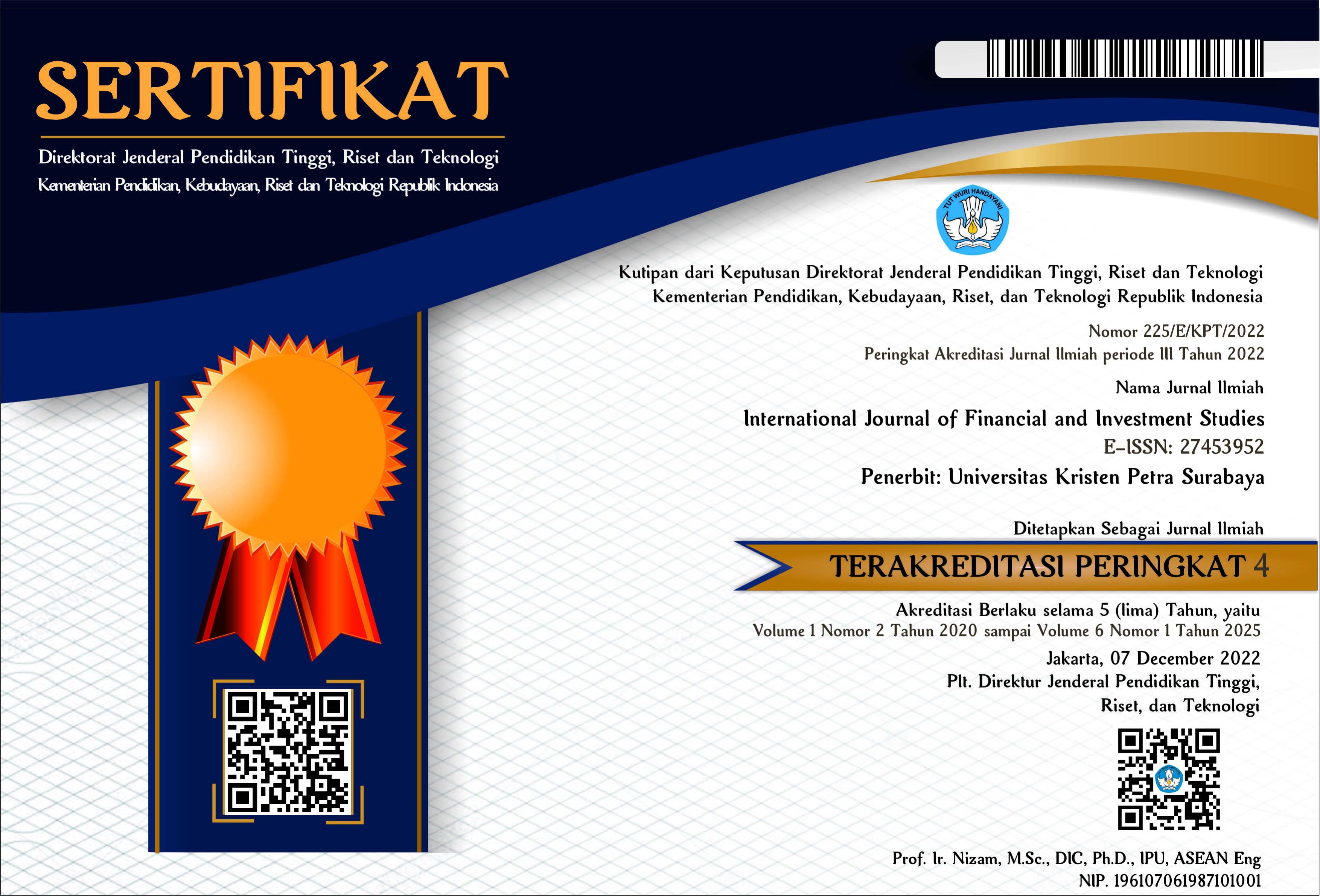THE INFLUENCE OF EMERGING ADULTHOOD STATUS AND SENSATION SEEKING ON FINANCIAL BEHAVIOR OF PETRA CHRISTIAN UNIVERSITY STUDENTS
Abstract
This study aims to determine the effect of emerging adulthood status and sensation seeking on students’ financial behavior. This type of research is descriptive with primary data sources. This study was conducted by distributing questionnaires to active undergraduate students at Petra Christian University. The 508 collected data were analyzed using SEM-AMOS 24. The results showed that emerging adulthood status had a significant effect on student’s financial behavior while sensation seeking didn’t have significant effect on students’ financial behavior.
References
Arnett, JJ (2000). Emerging Adulthood: A Theory of Development from the Late Teens Through the Twenties. American Psychologist, 55, 469-480.
Arnett, JJ (1998). Learning to Stand Alone: The Contemporary American Transition to Adulthood in Cultural and Historical Context. Human Development, 41, 295-315.
Bearden, & Haws, N. (2012). Handbook of Marketing Scales: Multi-Item Measures or Marketing and Customer Behavior Research (3th ed.). California: SAGE.
Greene, AL, Wheatley, SM, & Aldava, JF (1992). Stages on Life's Way: Adolescents' Implicit Theories of the Life Course. Journal of Adolescent Research, 7, 364-381.
Kuncoro, M. (2003). Research Methods for Business & Economics. Jakarta: Erlangga.
Kurniawan. J. Y., Malelak, M. I., & Astuti, D. (2020). Pengaruh attitude, subjective norm, past behavior, dan perceived control terhadap budgeting intention mahasiswa di Surabaya. International Journal of Financial and Investment Studies (IJFIS), 1(1), 21-29. https://doi.org/10.9744/ijfis.1.1.21-29
Olshavsky, RW, & Granbois, DH (1979). Consumer Decision Making: Fact or Fiction? The Journal of Consumer Research, 6 (2), 93-100.
Reifman, A., Arnett, JJ, & Colwell, MJ (2007). Emerging Adulthood: Theory, Assessment, and Application. Journal of Youth Development, 2 (1).
Ristekdikti. (2017). List of 100 Non-Polytechnic Higher Education Rankings in Indonesia in 2017. Retrieved from Ristekdikti: http://kelembentuk.ristekdikti.go.id/index.php/2017/08/18/daftar-100-perlai-perguruan-tinggi-non-politeknik-tahun-2017
Sabri, ea (2008). Financial Behavior and Problems among College Students in Malaysia: Research and Education Implication. Consumer Interests Annual, 54, 166-170.
Shim, S., Serido, J., Tang, C., & Card, N. (2015). Socialization Processes and Pathways to Healthy Financial Development for Emerging Young Adults. Journal of Applied Developmental Psychology, 38, 29-38.
Sinha, G., Tan, K., & Zhan, M. (2018). Patterns of Financial Attributes and Behaviors of Emerging Adults in the United States. Children and Youth Service Review, 93, 178-185.
Siswoyo, D. (2007). Science Education. Yogyakarta: UNY Press.
Supriyanto. (2009). Business Research Methods. Jakarta: PT Index.
Worthy, SL, Jonkman, J., & Blinn-Pike, L. (2010). Sensation-Seeking, Risk-Taking, and Problematic Financial Behaviors of College Students. Journal of Family and Economic Issues, 31 (2), 161-170.
Wahono, H. K., & Pertiwi, D. (2020). pengaruh financial literacy, materialism, compulsive buying terhadap propensity to indebtedness. International Journal of Financial and Investment Studies (IJFIS), 1(1), 1-14. https://doi.org/10.9744/ijfis.1.1.1-14
Xiao, J., Tang, C., & Shim, S. (2009). Acting for Happiness: Financial Behavior and Life Satisfaction of College Students. Social Indicators Research (92), 53-58.
Yusuf, S. (2012). Developmental Psychology of Children and Adolescents. Bandung: Youth Rosdakarya.
Zuckerman, M. (2007). Sensation Seeking and Risky Behavior. Washington DC, US: American Psychological Association.
Zuckerman, M. (1979). Sensation-Seeking: Beyond the Optimal Level of Arousal. Hillsdale: Lawrence Erlbaum.
Zuckerman, M., & Kuhlman, DM (2000). Personality and risk-taking: Common biosocial factors. Journal of Personality, 68, 999-1029.
Authors who publish in this journal agree to the following terms:
- Authors retain unrestricted copyright and full publishing rights. The authors grant the Publisher the right of first publication, with the work simultaneously licensed under the terms and conditions of the Creative Commons Attribution 4.0 International License.
- Authors can enter into separate, additional contractual arrangements for the non-exclusive distribution of the journal's published version of the work (e.g., post it to an institutional repository or publish it in a book), with an acknowledgment of its initial publication in this journal.
- Authors are permitted and encouraged to post their work online (e.g., in institutional repositories or on their website) before and during the submission process, as it can lead to productive exchanges and earlier and more extraordinary citations of published work.















